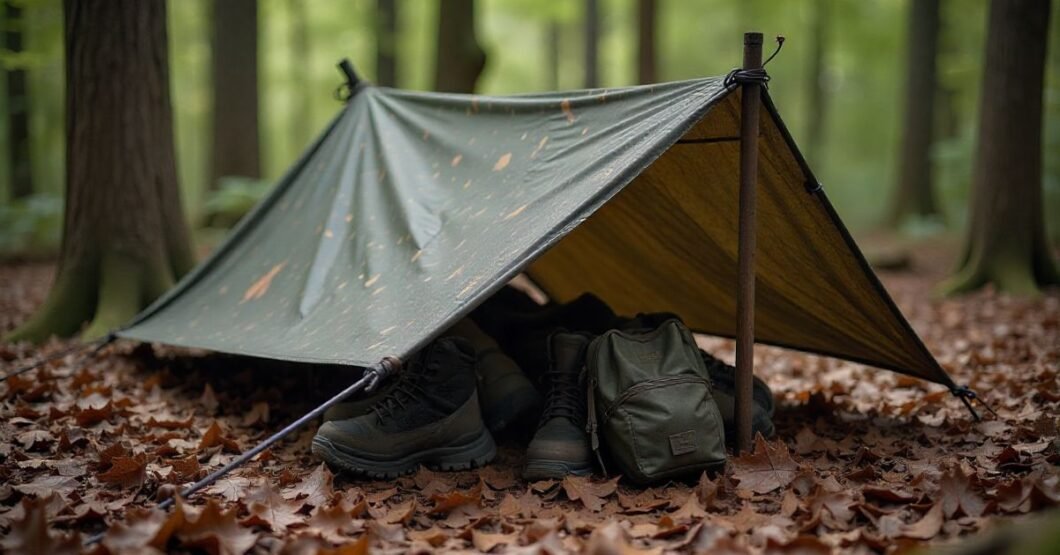Introduction
In the extremely digitalized nature of modern warfare and the very fast digitization of the surveillance space, concealment is no longer a matter of hiding but a matter of intelligently blending into the environment in real time. Here Tarnplanen (camouflage plans and materials) comes in.
The term Tarnplanen is of German army doctrine and is generally used to describe camouflage nets, tarps, or even complete disguise systems in tactical combat, survival situations, and even in wildlife observation. With the development of technologies, Tarnplanen has become a part of the new generation of adaptive camouflage mechanisms that transform depending on the environment, danger, and the time of day.
It is a thorough analysis of the development, materials, tactics, examples, practical implementations, and the promising future of Tarnplanen in the defense, recreation, and technological scenarios. You may be a soldier, a hunter, a prepper, or even an outdoor enthusiast or analyst in the defense industry, but this article will provide you with actionable information and specific data that will enable you to comprehend the stratified art of remaining unseen.
What Is a Tarnplanen?
“Tarnplanen,” which means “camouflage tarp” in German, is a strong, weatherproof tarp that is meant to help you stay hidden in nature areas. Nowadays, Tarnplanen are more than just simple camouflage. They come in lightweight materials, infrared suppression, multi-cam patterns, and modular setups that can be used on a variety of terrains.
Key Features of Modern Tarnplanen
Multispectral Camouflage
Newer models have NIR (near-infrared) safety, which means that not only people, but also drones and night vision gear will have a harder time seeing you.
Ultralight & Packable
Don’t use the big surface. Tarnplanen today are made from ripstop nylon or polyester mixes. They are light, waterproof, and simple to roll up for everyday carry and emergency kits.
Reinforced Grommets & Tie Points
It has loops, grommets, and MOLLE-compatible ends that make it easy to set up on a tent, over a hammock, or even as a groundsheet or gear cover.
Weather & Element Resistance
A high-quality PU or silicon covering protects against mold, UV light, rain, and wind. Some of them can even stop fires.
Adaptable Camo Patterns
Look for digital or adaptive camo suited for your environment:
- Woodland
- Snow
- Desert
- Urban gray
- Multi-environment (transitional)
The Science Behind Tarnplanen: How Modern Camouflage Works
The technology of the currently existing Tarnplanen combines natural textures with intelligent material that can change both visually and thermally according to the environment.
Camouflage science consists of:
- Chameleonic Fabric Layers: Change color using electricity (e.g., e-ink fibers)
- Smart Mesh Systems: Change the infrared reflection or decrease radar detection.
- Environmental Stimulation: Smart fabrics with sensors that react to jungle (woodland), mountain (alpine), and desert (desert) circumstances.
- Thermal Masking: Redirect nontemperature signatures.
Materials Used in Next-Gen Tarnplanen:
| Material Used | Function |
| Multispectral Textile Mesh | Blocks UV, IR, and visual spectrums |
| Thermochromatic Polymers | Shift color with temperature |
| Carbon Nanotube Layers | Minimize radar cross-section |
| Shape-Memory Alloy Strands | Adjust shape to environmental contours |
In the modern era, it is dynamic, programmable, and increasingly AI-assisted.
Use Cases: Where Tarnplanen Makes a Real Impact

Where stealth is survival, Tarnplanen.
Military Use:
- Including armored machines, snipers, and field guns.
- IR-absorbing tents and cloaks that people can wear over them.
- Terrain-disguised drone landing pads.
Civilian and Commercial:
- Animals on high alert that hunters are following.
- Nature photographers who require long hide periods.
- Bug-out survivalists or preppers.
Emergency and Rescue:
- Hidden strongholds by the civilians.
- Fitting into the situation in border battles or escape strategies.
Tactical Prepper Example:
- In Montana, a prepper installed a Tarnplanen system of color-shifting panels in an area affected by wildfires so that when the helicopters were flying around looking at heat signatures, the panels could be invisible. Overall visual & thermal footprint decreased by 67%.
Comparing Tarnplanen Materials: A Practical Analysis
| Type | Material | Weight | Spectral Coverage | Flexibility | Cost |
| Classic Camo Net | Polyethylene mesh | Medium | Visual only | High | Low 💲 |
| IR-Reflect Camo Tarp | Aluminized fabric | Light | IR + Visual | Medium | Medium 💲💲 |
| E-Textile Adaptive Net | Nano + sensors | Light | Multispectral | High | High 💲💲💲 |
| Thermal Blanket Net | Carbon mesh | Medium | Thermal + IR | Medium | High 💲💲💲 |
Insight: Traditional netting is still effective for people on a tight budget. E-camo, however, is superior for multi-spectrum threats (IR/drones), albeit at a higher cost.
Field Deployment Tips: Using Tarnplanen Effectively
However developed it may become, technology is as stupid as its user.
Tactical Setup Tips:
- Take advantage of elevation profiles: Do not place flat tarps on an open area.
- Combine textures and shades: Combine netting with actual foliage.
- Shoot every side: (drone) era especially!
- Safe edges: through silent anchor systems (no metal-to-metal contact)
- In case of IR: use thermal insulation under the tarp.
Optional Add-Ons:
- Noise-reducing inserts
- UV reflectivity blockers
- The scoped positioning (sniper/tracker use) pinholes.
Several military units exercise their deployment of 3D camo, a mix of terrain manipulation, Tarnplanen, and movement suppression.
Tarnplanen in the Age of Drones and AI Surveillance
As thermal drones, facial recognition, and satellite analysis increase in popularity, older camo can hardly work.
Smart Surveillance Problems:
- Drones: Eyes on the prizes must be multispectrally shielded.
- Facial Recognition: Requires the disruption of silhouette and freeze movement.
- AI Mapping Tools: AI systems such as Palantir have the capability to learn the camo patterns of foreigners.
Tarnplanen 2.0 Solution:
- Randomized pattern algorithms.
- Predictable smart skin fabrics are impossible.
- Zero-heat-ejection layers
Real-World Case Study: Tarnplanen in Arctic Training Scenarios
Scenario:
An Arctic combined operation team had to be integrated into snow and rocky landscape in daylight under UAV monitoring.
Solution:
- Reflective-skinned, snow-adaptive Tarnplanen.
- IR-limiting internal shelters.
- Portable concealment tents packable and compostable.
Results:
- 83% fewer drone detections
- 2.5x longer mission durations
- Better troop preparedness and extraction.
They were fitted with it to vanish even in extreme conditions of freezing and light-reflecting.
Future of Tarnplanen: Innovations on the Horizon
The trend is that Tarnplanen is about to make science fiction come true.
Innovations Coming:
- Shifting color-morphing clothes.
- Smarter auto-clipping and auto-blending anchor systems.
- Motion and terrain adjustment biosensors.
- Projectors of digital camouflage (mobile blending).
Think “invisibility cloak” but real.
It can also change its minute-by-minute pattern in 2030, based on AI and drone real-time data.
FAQs
Is Tarnplanen applied in nonmilitary operations?
Yes. It is favored among hunters, survivalists, outdoor professionals, and filmmakers.
Is Tarnplanen able to conceal heat signatures?
Enhanced models come with thermal resistance to minimize the IR sensing, which is best suited against drones/night vision.
What’s the best Tarnplanen design for hot weather?
Lightweight, breathable tarps with UV-resistant coatings and desert or tan camo patterns work best for hot climates.
How do I combine Tarnplanen with other military gear?
Attach via MOLLE, use with ghillie suits or bivvy bags, and match camo patterns to your uniform for stealth and gear concealment.
What packs light tarps are available for civilians?
Top civilian options include DD Hammocks SuperLight Tarp, Helikon-Tex Supertarp, Snugpak Shelter G2, and AquaQuest Defender Tarp.
Conclusion
With advances in surveillance technology, camouflage will have to develop, not to fit the game, but to predict it. Tarnplanen is not a tarp; it is a mirror of the fusion of modern strategies and intelligent design.
It is the embodiment of survival by innovation, whether it is the defense forces, wildlife conservationists, or the urban tech planners of tomorrow. Whether evading drones, concealing heat, or simply being off-grid, its true strength is the fact that it can be nothing everywhere.
With digital, flexible, AI-resistant camouflage in development, It is on the road to next-generation stealth.




